- Home
- Christopher Paolini
Eldest Page 4
Eldest Read online
Page 4
“Nor you I.”
Nasuada paused, then gazed into his eyes and added in a gentler tone: “You have my condolences, Eragon. I realize that others beside myself have cause for sorrow; while I have lost my father, you have also lost a friend. I liked Murtagh a great deal and it saddens me that he is gone…. Goodbye, Eragon.”
Eragon nodded, a bitter taste in his mouth, and left the room with Saphira. The hallway outside was empty along its gray length. Eragon put his hands on his hips, tilted back his head, and exhaled. The day had barely begun, yet he was already exhausted by all the emotions that had flooded through him.
Saphira nosed him and said, This way. Without further explanation, she headed down the right side of the tunnel. Her polished claws clicked on the hard floor.
Eragon frowned, but followed her. Where are we going? No answer. Saphira, please. She just flicked her tail. Resigned to wait, he said instead, Things have certainly changed for us. I never know what to expect from one day to the next—except sorrow and bloodshed.
All is not bad, she reproached. We have won a great victory. It should be celebrated, not mourned.
It doesn’t help, having to deal with this other nonsense.
She snorted angrily. A thin line of fire shot from her nostrils, singeing Eragon’s shoulder. He jumped back with a yelp, biting back a string of curses. Oops, said Saphira, shaking her head to clear the smoke.
Oops! You nearly roasted my side!
I didn’t expect it to happen. I keep forgetting that fire will come out if I’m not careful. Imagine that every time you raised your arm, lightning struck the ground. It would be easy to make a careless motion and destroy something unintentionally.
You’re right…. Sorry I growled at you.
Her bony eyelid clicked as she winked at him. No matter. The point I was trying to make is that even Nasuada can’t force you to do anything.
But I gave my word as a Rider!
Maybe so, but if I must break it to keep you safe, or to do the right thing, I will not hesitate. It is a burden I could easily carry. Because I’m joined to you, my honor is inherent in your pledge, but as an individual, I’m not bound by it. If I must, I will kidnap you. Any disobedience then would be no fault of your own.
It should never come to that. If we have to use such tricks to do what’s right, then Nasuada and the Varden will have lost all integrity.
Saphira stopped. They stood before the carved archway of Tronjheim’s library. The vast, silent room seemed empty, though the ranks of back-to-back bookshelves interspersed with columns could conceal many people. Lanterns poured soft light across the scroll-covered walls, illuminating the reading alcoves along their bases.
Weaving through the shelves, Saphira led him to one alcove, where Arya sat. Eragon paused as he studied her. She seemed more agitated than he had ever seen her, though it manifested itself only in the tension of her movements. Unlike before, she wore her sword with the graceful crossguard. One hand rested on the hilt.
Eragon sat at the opposite side of the marble table. Saphira positioned herself between them, where neither could escape her gaze.
“What have you done?” asked Arya with unexpected hostility.
“How so?”
She lifted her chin. “What have you promised the Varden? What have you done?”
The last part even reached Eragon mentally. He realized just how close the elf was to losing control. A bit of fear touched him. “We only did what we had to. I’m ignorant of elves’ customs, so if our actions upset you, I apologize. There’s no cause to be angry.”
“Fool! You know nothing about me. I have spent seven decades representing my queen here—fifteen years of which I bore Saphira’s egg between the Varden and the elves. In all that time, I struggled to ensure the Varden had wise, strong leaders who could resist Galbatorix and respect our wishes. Brom helped me by forging the agreement concerning the new Rider—you. Ajihad was committed to your remaining independent so that the balance of power would not be upset. Now I see you siding with the Council of Elders, willingly or not, to control Nasuada! You have overturned a lifetime of work! What have you done?”
Dismayed, Eragon dropped all pretenses. With short, clear words, he explained why he had agreed to the council’s demands and how he and Saphira had attempted to undermine them.
When he finished, Arya stated, “So.”
“So.” Seventy years. Though he knew elves’ lives were extraordinarily long, he had never suspected that Arya was that old, and older, for she appeared to be a woman in her early twenties. The only sign of age on her unlined face was her emerald eyes—deep, knowing, and most often solemn.
Arya leaned back, studying him. “Your position is not what I would wish, but better than I had hoped. I was impolite; Saphira…and you…understand more than I thought. Your compromise will be accepted by the elves, though you must never forget your debt to us for Saphira. There would be no Riders without our efforts.”
“The debt is burned into my blood and my palm,” said Eragon. In the silence that followed, he cast about for a new topic, eager to prolong their conversation and perhaps learn more about her. “You have been gone for such a long time; do you miss Ellesméra? Or did you live elsewhere?”
“Ellesméra was, and always shall be, my home,” she said, looking beyond him. “I have not lived in my family’s house since I left for the Varden, when the walls and windows were draped with spring’s first flowers. The times I’ve returned were only fleeting stays, vanishing flecks of memory by our measurement.”
He noticed, once again, that she smelled like crushed pine needles. It was a faint, spicy odor that opened his senses and refreshed his mind. “It must be hard to live among all these dwarves and humans without any of your kind.”
She cocked her head. “You speak of humans as if you weren’t one.”
“Perhaps…,” he hesitated, “perhaps I am something else—a mixture of two races. Saphira lives inside me as much as I live in her. We share feelings, senses, thoughts, even to the point where we are more one mind than two.” Saphira dipped her head in agreement, nearly bumping the table with her snout.
“That is how it should be,” said Arya. “A pact more ancient and powerful than you can imagine links you. You won’t truly understand what it means to be a Rider until your training is completed. But that must wait until after the funeral. In the meantime, may the stars watch over you.”
With that she departed, slipping into the library’s shadowed depths. Eragon blinked. Is it me, or is everyone on edge today? Like Arya—one moment she’s angry, the next she’s giving me a blessing!
No one will be comfortable until things return to normal.
Define normal.
RORAN
Roran trudged up the hill.
He stopped and squinted at the sun through his shaggy hair. Five hours till sunset. I won’t be able to stay long. With a sigh, he continued along the row of elm trees, each of which stood in a pool of uncut grass.
This was his first visit to the farm since he, Horst, and six other men from Carvahall had removed everything worth salvaging from the destroyed house and burned barn. It had been nearly five months before he could consider returning.
Once on the hilltop, Roran halted and crossed his arms. Before him lay the remains of his childhood home. A corner of the house still stood—crumbling and charred—but the rest had been flattened and was already covered with grass and weeds. Nothing could be seen of the barn. The few acres they had managed to cultivate each year were now filled with dandelions, wild mustard, and more grass. Here and there, stray beets or turnips had survived, but that was all. Just beyond the farm, a thick belt of trees obscured the Anora River.
Roran clenched a fist, jaw muscles knotting painfully as he fought back a combination of rage and grief. He stayed rooted to the spot for many long minutes, trembling whenever a pleasant memory rushed through him. This place had been his entire life and more. It had been his past…and his future
. His father, Garrow, once said, “The land is a special thing. Care for it, and it’ll care for you. Not many things will do that.” Roran had intended to do exactly that up until the moment his world was ruptured by a quiet message from Baldor.
With a groan, he spun away and stalked back toward the road. The shock of that moment still resonated within him. Having everyone he loved torn away in an instant was a soul-changing event from which he would never recover. It had seeped into every aspect of his behavior and outlook.
It also forced Roran to think more than ever before. It was as if bands had been cinched around his mind, and those bands had snapped, allowing him to ponder ideas that were previously unimaginable. Such as the fact that he might not become a farmer, or that justice—the greatest standby in songs and legends—had little hold in reality. At times these thoughts filled his consciousness to the point where he could barely rise in the morning, feeling bloated with their heaviness.
Turning on the road, he headed north through Palancar Valley, back to Carvahall. The notched mountains on either side were laden with snow, despite the spring greenery that had crept over the valley floor in past weeks. Overhead, a single gray cloud drifted toward the peaks.
Roran ran a hand across his chin, feeling the stubble. Eragon caused all this—him and his blasted curiosity—by bringing that stone out of the Spine. It had taken Roran weeks to reach that conclusion. He had listened to everyone’s accounts. Several times he had Gertrude, the town healer, read aloud the letter Brom had left him. And there was no other explanation. Whatever that stone was, it must have attracted the strangers. For that alone, he blamed Garrow’s death on Eragon, though not in anger; he knew that Eragon had intended no harm. No, what roused his fury was that Eragon had left Garrow unburied and fled Palancar Valley, abandoning his responsibilities to gallop off with the old storyteller on some harebrained journey. How could Eragon have so little regard for those left behind? Did he run because he felt guilty? Afraid? Did Brom mislead him with wild tales of adventure? And why would Eragon listen to such things at a time like that?…I don’t even know if he’s dead or alive right now.
Roran scowled and rolled his shoulders, trying to clear his mind. Brom’s letter…Bah! He had never heard a more ridiculous collection of insinuations and ominous hints. The only thing it made clear was to avoid the strangers, which was common sense to begin with. The old man was crazy, he decided.
A flicker of movement caused Roran to turn, and he saw twelve deer—including a young buck with velvet horns—trotting back into the trees. He made sure to note their location so he could find them tomorrow. He was proud that he could hunt well enough to support himself in Horst’s house, though he had never been as skilled as Eragon.
As he walked, he continued to order his thoughts. After Garrow’s death, Roran had abandoned his job at Dempton’s mill in Therinsford and returned to Carvahall. Horst had agreed to house him and, in the following months, had provided him with work in the forge. Grief had delayed Roran’s decisions about the future until two days ago, when he finally settled upon a course of action.
He wanted to marry Katrina, the butcher’s daughter. The reason he went to Therinsford in the first place was to earn money to ensure a smooth beginning to their life together. But now, without a farm, a home, or means to support her, Roran could not in good conscience ask for Katrina’s hand. His pride would not allow it. Nor did Roran think Sloan, her father, would tolerate a suitor with such poor prospects. Even under the best of circumstances, Roran had expected to have a hard time convincing Sloan to give up Katrina; the two of them had never been friendly. And it was impossible for Roran to wed Katrina without her father’s consent, not unless they wished to divide her family, anger the village by defying tradition, and, most likely, start a blood feud with Sloan.
Considering the situation, it seemed to Roran that the only option available to him was to rebuild his farm, even if he had to raise the house and barn himself. It would be hard, starting from nothing, but once his position was secured, he could approach Sloan with his head held high. Next spring is the soonest we might talk, thought Roran, grimacing.
He knew Katrina would wait—for a time, at least.
He continued at a steady pace until evening, when the village came into view. Within the small huddle of buildings, wash hung on lines strung from window to window. Men filed back toward the houses from surrounding fields thick with winter wheat. Behind Carvahall, the half-mile-high Igualda Falls gleamed in the sunset as it tumbled down the Spine into the Anora. The sight warmed Roran because it was so ordinary. Nothing was more comforting than having everything where it should be.
Leaving the road, he made his way up the rise to where Horst’s house sat with a view of the Spine. The door was already open. Roran tromped inside, following the sounds of conversation into the kitchen.
Horst was there, leaning on the rough table pushed into one corner of the room, his arms bare to the elbow. Next to him was his wife, Elain, who was nearly five months pregnant and smiling with quiet contentment. Their sons, Albriech and Baldor, faced them.
As Roran entered, Albriech said, “…and I still hadn’t left the forge yet! Thane swears he saw me, but I was on the other side of town.”
“What’s going on?” asked Roran, slipping off his pack.
Elain exchanged a glance with Horst. “Here, let me get you something to eat.” She set bread and a bowl of cold stew before him. Then she looked him in the eye, as if searching for a particular expression. “How was it?”
Roran shrugged. “All of the wood is either burnt or rotting—nothing worth using. The well is still intact, and that’s something to be grateful for, I suppose. I’ll have to cut timber for the house as soon as possible if I’m going to have a roof over my head by planting season. Now tell me, what’s happened?”
“Ha!” exclaimed Horst. “There’s been quite a row, there has. Thane is missing a scythe and he thinks Albriech took it.”
“He probably dropped it in the grass and forgot where he left it,” snorted Albriech.
“Probably,” agreed Horst, smiling.
Roran bit into the bread. “It doesn’t make much sense, accusing you. If you needed a scythe, you could just forge one.”
“I know,” said Albriech, dropping into a chair, “but instead of looking for his, he starts grousing that he saw someone leaving his field and that it looked a bit like me…and since no one else looks like me, I must have stolen the scythe.”
It was true that no one looked like him. Albriech had inherited both his father’s size and Elain’s honey-blond hair, which made him an oddity in Carvahall, where brown was the predominant hair color. In contrast, Baldor was both thinner and dark-haired.
“I’m sure it’ll turn up,” said Baldor quietly. “Try not to get too angry over it in the meantime.”
“Easy for you to say.”
As Roran finished the last of the bread and started on the stew, he asked Horst, “Do you need me for anything tomorrow?”
“Not especially. I’ll just be working on Quimby’s wagon. The blasted frame still won’t sit square.”
Roran nodded, pleased. “Good. Then I’ll take the day and go hunting. There are a few deer farther down the valley that don’t look too scrawny. Their ribs weren’t showing, at least.”
Baldor suddenly brightened. “Do you want some company?”
“Sure. We can leave at dawn.”
When he finished eating, Roran scrubbed his face and hands clean, then wandered outside to clear his head. Stretching leisurely, he strolled toward the center of town.
Halfway there, the chatter of excited voices outside the Seven Sheaves caught his attention. He turned, curious, and made his way to the tavern, where an odd sight met him. Sitting on the porch was a middle-aged man draped in a patchwork leather coat. Beside him was a pack festooned with the steel jaws of the trappers’ trade. Several dozen villagers listened as he gestured expansively and said, “So when I arrived at Therinsfo
rd, I went to this man, Neil. Good, honest man; I help in his fields during the spring and summer.”
Roran nodded. Trappers spent the winter squirreled away in the mountains, returning in the spring to sell their skins to tanners like Gedric and then to take up work, usually as farmhands. Since Carvahall was the northernmost village in the Spine, many trappers passed through it, which was one of the reasons Carvahall had its own tavern, blacksmith, and tanner.
“After a few steins of ale—to lubricate my speaking, you understand, after a ’alf year with nary a word uttered, except perhaps for blaspheming the world and all beyond when losing a bear-biter—I come to Neil, the froth still fresh on my beard, and start exchanging gossip. As our transaction proceeds, I ask him all gregarious-like, what news of the Empire or the king—may he rot with gangrene and trench mouth. Was anyone born or died or banished that I should know of? And then guess what? Neil leaned forward, going all serious ’bout the mouth, and said that word is going around, there is, from Dras-Leona and Gil’ead of strange happenings here, there, and everywhere in Alagaësia. The Urgals have fair disappeared from civilized lands, and good riddance, but not one man can tell why or where. ’Alf the trade in the Empire has dried up as a result of raids and attacks and, from what I heard, it isn’t the work of mere brigands, for the attacks are too widespread, too calculated. No goods are stolen, only burned or soiled. But that’s not the end of it, oh no, not by the tip of your blessed grandmother’s whiskers.”
The trapper shook his head and took a sip from his wineskin before continuing: “There be mutterings of a Shade haunting the northern territories. He’s been seen along the edge of Du Weldenvarden and near Gil’ead. They say his teeth are filed to points, his eyes are as red as wine, and his hair is as red as the blood he drinks. Worse, something seems to have gotten our fine, mad monarch’s dander up, so it has. Five days past, a juggler from the south stopped in Therinsford on his lonesome way to Ceunon, and he said that troops have been moving and gathering, though for what was beyond him.” He shrugged. “As my pap taught me when I was a suckling babe, where there’s smoke, there’s fire. Perhaps it’s the Varden. They’ve caused old Iron Bones enough pain in the arse over the years. Or perhaps Galbatorix finally decided he’s had enough of tolerating Surda. At least he knows where to find it, unlike those rebels. He’ll crush Surda like a bear crushes an ant, he will.”

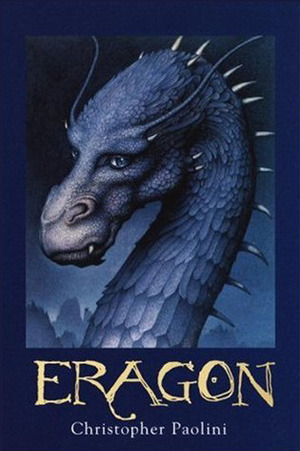 Eragon
Eragon Eldest
Eldest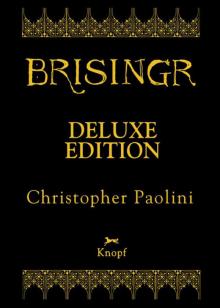 Brisingr
Brisingr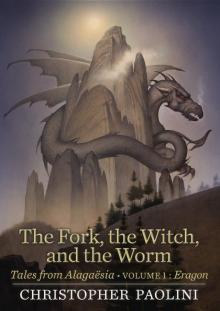 The Fork, the Witch, and the Worm
The Fork, the Witch, and the Worm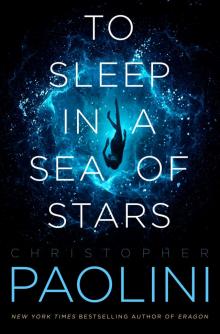 To Sleep in a Sea of Stars
To Sleep in a Sea of Stars![Eldest [en] i-2 Read online](http://i1.bookreadfree.com/i/03/19/eldest_en_i-2_preview.jpg) Eldest [en] i-2
Eldest [en] i-2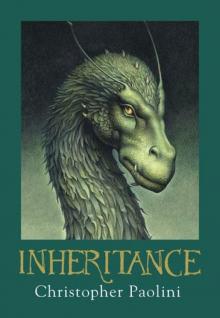 Inheritance i-4
Inheritance i-4![Brisingr [en] i-3 Read online](http://i1.bookreadfree.com/i1/03/31/brisingr_en_i-3_preview.jpg) Brisingr [en] i-3
Brisingr [en] i-3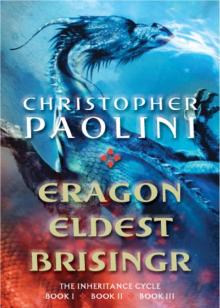 Inheritance Cycle Omnibus
Inheritance Cycle Omnibus